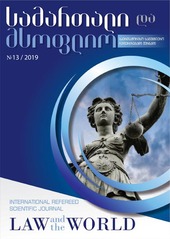RESTRICTIONS ON FREEDOM OF EXPRESSION FOR THE PORTECTION OF THE AUTHORITY AND IMPARTIALITY OF THE JUDICIARY (Overview of the Strasbourg Jurisprudence) 
##plugins.themes.bootstrap3.article.main##
Abstract
This Article concerns the issue of conflict of two important values – freedom of expression, which is one of the pillars of a democratic state, and the public interest in protection of the authority and impartiality of the Judiciary. The Article demonstrates the particular importance of the mentioned topic for Georgia where the society, in general, has easily learned how to enjoy fundamental human rights and freedoms, however, it still has not developed the corresponding legal culture – to always keep in mind the corresponding obligations and responsibilities inherent to each fundamental freedom; and culture not to ignore other legitimate interests and seek the balance between the conflicting values . The Article overviews respective case law of the European Court of Human Rights and the Court’s approaches in two main directions – the scope of admissible criticism towards judiciary, mostly involving judicial authority issues, and the problem of media coverage of ongoing cases, involving impartiality and other issues. There will be analyzed not only those judgments where the Court found justifiable the restrictions imposed on the freedom of expression for the purposes of the protection of the authority and impartiality of the judiciary, but also those ones where Court decided otherwise and found a violation of Art. 10 of the ECHR. The Article includes almost all main concepts, factors, principles, proetcontra proetcontra arguments used by the Court while assessing the balance reached by national authorities in the cases concerning court criticism, such as: doctrine of admissible criticism; difference between the criticism of the court system and the personal assault of particular judges; distinction between a healthy criticism from the outside forces that courts should benefit from, and classical cases of contempt of court; differences between value judgment and proof of facts; obligation to provide a minimum factual basis even for the value judgments; importance to maintain the authority of the judiciary and the public trust; specific issues of the court criticism conducted by a lawyer considering their role in the administration of justice; judicial self-restrain and lack of power to respond to the criticism, etc. In addition, relevant approaches and standards are provided with regard to the second issue, concerning media coverage of ongoing cases. The Author agrees with the ECtHR’s position that parallel pseudo-trials of ongoing cases operated by newspapers or TV shows entails a great risk of violation of presumption of innocence, “prejudgment“ of the cases, influence over the judges and juries and puts into question the public perception that courts are the only proper forums for resolving legal issues. Respectively, usurpation of the court’s role by media should be avoided. The Article indicates that these approaches have roots in English Common law, according to which contempt of court might be committed by publication of material that has a potential to influence in advance the formation of a public opinion on legal merits of a pending case.
##plugins.themes.bootstrap3.article.details##
Section
Articles
How to Cite
RESTRICTIONS ON FREEDOM OF EXPRESSION FOR THE PORTECTION OF THE AUTHORITY AND IMPARTIALITY OF THE JUDICIARY (Overview of the Strasbourg Jurisprudence). (2019). Law and World, 5(13), 32-55. https://lawandworld.ge/index.php/law/article/view/177


